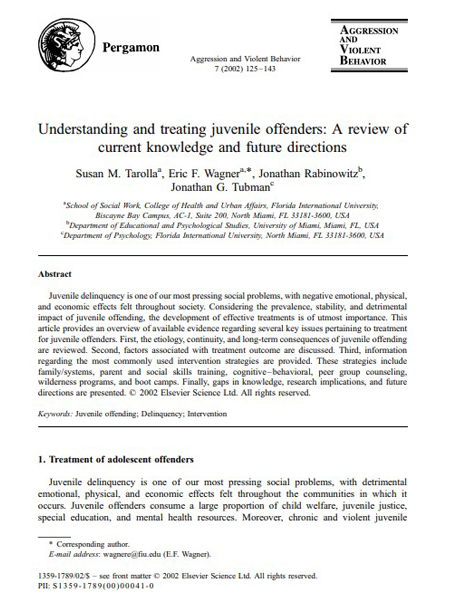Understanding and treating juvenile offenders: A review of current knowledge and future directions
 Abstract: Juvenile delinquency is one of our most pressing social problems, with negative emotional, physical, and economic effects felt throughout society. Considering the prevalence, stability, and detrimental impact of juvenile offending, the development of effective treatments is of utmost importance. This article provides an overview of available evidence regarding several key issues pertaining to treatment for juvenile offenders. First, the etiology, continuity, and long-term consequences of juvenile offending are reviewed. Second, factors associated with treatment outcome are discussed. Third, information regarding the most commonly used intervention strategies are provided. These strategies include family/systems, parent and social skills training, cognitive–behavioral, peer group counseling, wilderness programs, and boot camps. Finally, gaps in knowledge, research implications, and future directions are presented.
Abstract: Juvenile delinquency is one of our most pressing social problems, with negative emotional, physical, and economic effects felt throughout society. Considering the prevalence, stability, and detrimental impact of juvenile offending, the development of effective treatments is of utmost importance. This article provides an overview of available evidence regarding several key issues pertaining to treatment for juvenile offenders. First, the etiology, continuity, and long-term consequences of juvenile offending are reviewed. Second, factors associated with treatment outcome are discussed. Third, information regarding the most commonly used intervention strategies are provided. These strategies include family/systems, parent and social skills training, cognitive–behavioral, peer group counseling, wilderness programs, and boot camps. Finally, gaps in knowledge, research implications, and future directions are presented.
Tarolla, S.M., Wagner, E.F., Rabinowitz, J., & Tubman, J.G. (2002). Understanding and treating juvenile offenders: A review of current knowledge and future directions. Aggression & Violent Behavior, 7(2), 125. doi:10.1016/S1359-1789(00)00041-0
